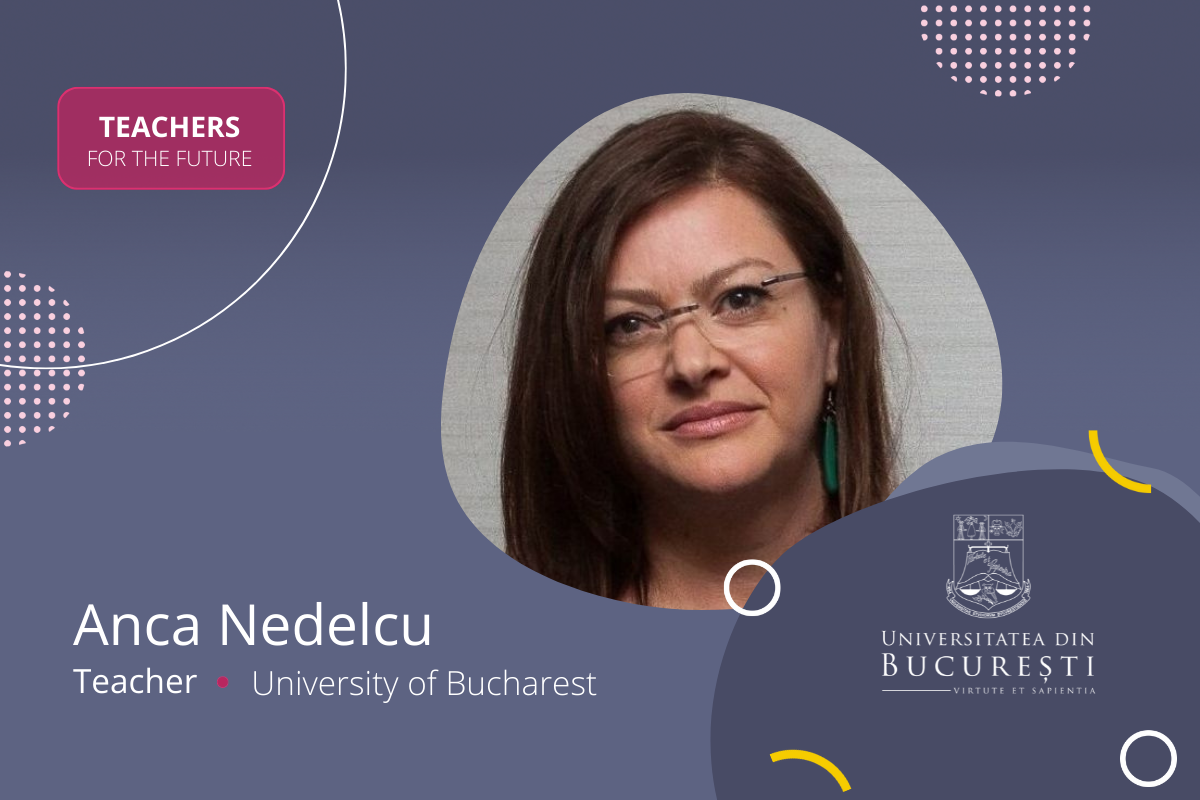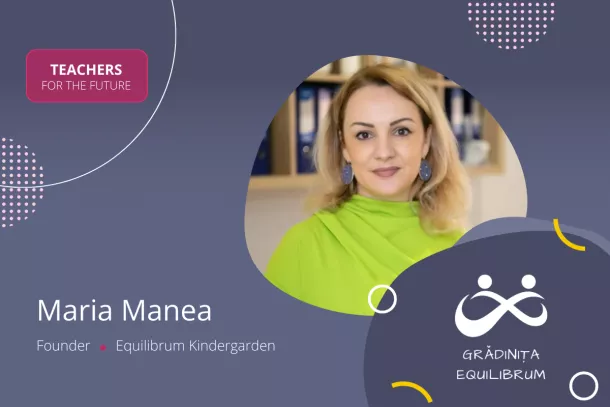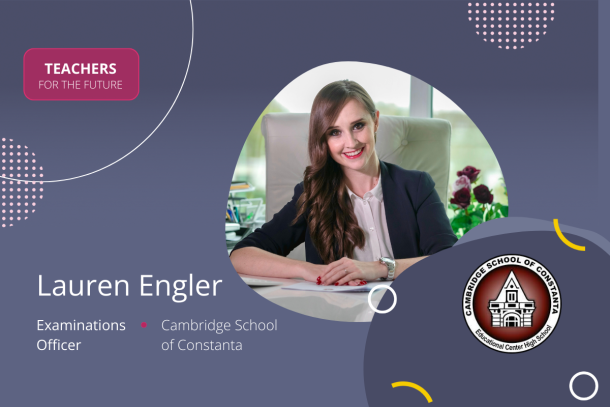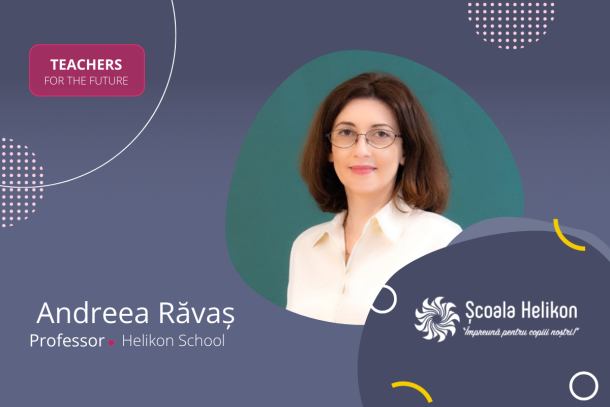For World Teachers' Day, we asked passionate teachers in the Kinderpedia community some questions about the qualities and vision of a good teacher.
Discover below the answers of Anca Nedelcu, professor at the Faculty of Psychology and Educational Sciences, University of Bucharest.
What is, in your view, the impact of a good teacher on the future of a child?
Without any doubt, teachers have a significant impact in the lives of students and in learning communities! I affirm this not only through personal observation, but also through the evidence of solid research. For example, there are studies that talk about the difference between the impact of a good teacher on student test scores versus the significantly reduced impact of a less prepared teacher. This could be a significant advance, even equivalent to years of schooling. Similar points about teachers' contributions are made by John Hattie, for example, who talks about the collective teacher impact on students.
So, a good teacher makes a difference, his/her work is visible, it generates effects. A good teacher has a positive influence on all learners, creating opportunities for growth both for those who come from an advantaged socio-economic background, but especially for those with more pronounced support needs, whom he/she sees and supports to reach their potential. As a result, the value added by such a good teacher in a single year of study significantly influences future performance in the lives of these students, supporting their long-term professional and social integration. In a few consecutive years of effective teaching, learning deficiencies can be compensated for and pupils can be helped to reach their full potential.
Which are the key attributes and competencies of a good teacher?
There are many theories about the key competencies of a good teacher, many perspectives, many approaches. Essentially, most discussions about teaching skills focus on a few specific directions. A competent teacher is a good specialist, has a firm and accurate control of the subject, knows how to make connections and correspondences between topics, is confident and secure in the quality of the content he/she teaches. Among the coordinates of the portrait of a good teacher, we can talk about competences that focus on how exactly he/she teaches, competences that relate to the instrumental area, methods and techniques. There are so many cases of didactically inept scholars, of specialists without empathy, who live inside formulae, chemical equations or declensions made by the book but who cannot help their pupils to understand them, to translate these messages into language that is accessible and suitable for the individual needs of students. Finally, we must also bring in the attributes that relate to the socio-emotional area, the attitudinal-expressive dimension, talking about how a good teacher manages to feel a child, a class, a community, to identify needs and respond to them in order to contribute to growth and development.
There is no magic recipe for miracle skills. But a good teacher certainly manages to use all of the above to help their students reach their potential.
What will the teacher of the future look like (ed. 20-30 years from now)?
Let's remember what the teacher looked like in the past, ask ourselves what he/she is like now and reflect on what he/she will be like in 20-30 years. Will it be fundamentally different? It's hard to say, especially as we see that over time there are many teaching skills that remain constant and are functional in different contexts. A good teacher knows how to use all the contexts around them, whether we are talking about a more dynamic, digitalised, challenging world, new generations with complex needs, communities and collaborations with professionals in related fields. A good teacher needs a strong pedagogical skillset to shape an appropriate strategy and respond to all these new demands. So today, as yesterday, a good teacher uses everything around him to help children grow, no matter what the world around him looks like.
Apart from these constants, it is likely that in future teaching contexts 20-30 years from now, teachers will be forced to be more flexible, more open to breaking out of patterns, producing and using innovative solutions to build viable learning communities.
What elements of the education - as we know it today - do you think will stand the test of time (ideas, philosophies, practices etc.)?
Good pedagogy transcends times, bad or good! What is focused on the child, on personalising learning, on building authentic, useful developmental experiences, everything about schooling that produces learning, joy, progress, communication, collaboration, seriousness, all these things will remain relevant forever.
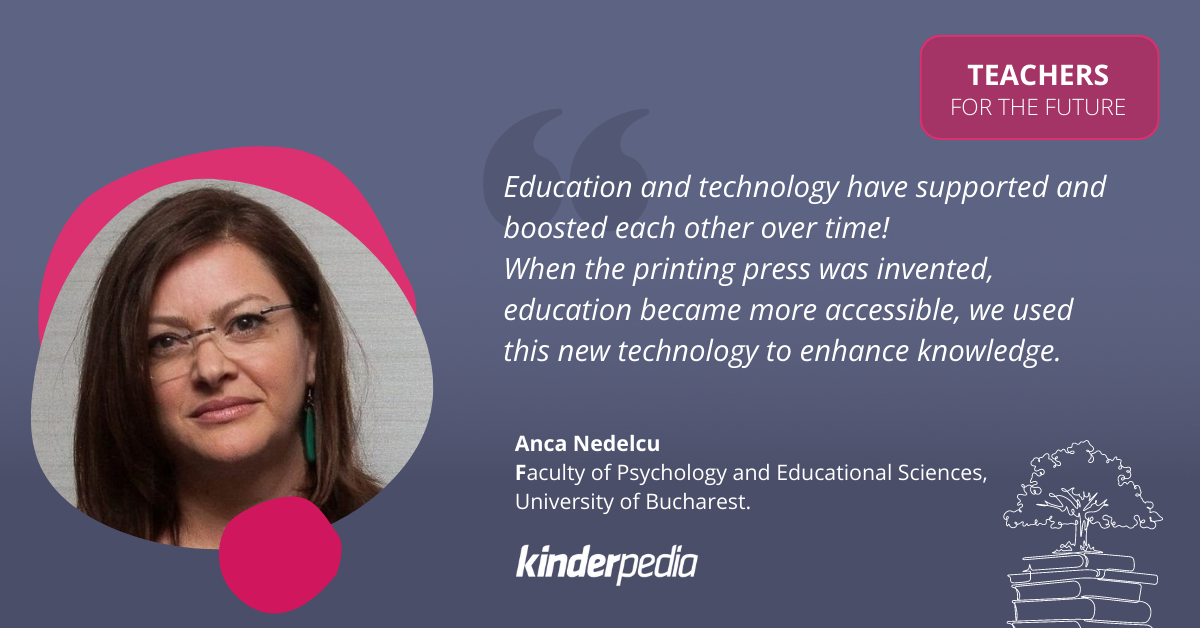
How do you see the role of technology in education - now and in the future?
Education has always turned to technology, they have supported and boosted each other! For example, when the printing press was invented, education became more accessible and we used this new technology to expand knowledge; when we invented the television we used it as a resource in education as well; in the pandemic, we demonstrated once again how technology helps and why it is valuable to our field. However, we must note that poor pedagogy kills any good technology!
It is valuable to understand that for quality education, it is not enough to have smart technology, we need to know how exactly we can bring this technology to the benefit of the educational process. We need to use new technologies creatively and integrate them meaningfully into education to fulfil an important function. Technology comes to support learning only when we know how to use it appropriately and effectively!
One classroom experience you will never forget
Unfortunately, I don't have something amazing to surprise and charm readers, I don't have a story in mind to share, but I can tell you about the feeling of a job well done I get after meeting with students. It's a specific taste you take with you after a series of valuable and meaningful discussions, a taste you leave the classroom with, a smile of satisfaction that I think many know all too well. So, I cannot speak of a fluke, but of a joy that is never forgotten: that of a job well done! And this is not an accident, it is a consistent, long-term effort.
What was your first day as a teacher like?
Emotional, perhaps overwhelming for the participants, but also for me and with thoughts of "next time it will be better". I crossed two debuts in the teaching profession, both hesitant and shaky, like all beginnings probably. The first, shortly after finishing pedagogical high school, which I felt to be too soon and too much, and the second, for another teaching career: university, less abrupt and more sustained by peer support. In both cases, I behaved typically, like a... beginner: I spoke too much, I think, too hastily, gave no time for interlocutors to react, left no space for discussion that would have taken me out of the overloaded string of home-prepared information I had ambitions to pour into the classroom. The teaching patience, the wisdom of debate, the confidence in the process and not just the end result came with time. At least I hope so.
However, it's clear that all of these teaching beginnings are fascinating and stay with us over time! What is certain is that we are entitled to beginnings, hesitations and emotions. And especially that beginners should not be left alone! A mentor, a colleague, a coach, a friend, all can be a support.
What was your first day at school like as a child?
Although I am professionally involved in education, paradoxically, I don't remember my first day at school! Sure, I've tried to piece together memories from conversations with adults that accompanied this moment, but I'll only flesh out that uniquely nostalgic beginning taste, that bittersweet, hard to label. I hope that today's students have memorable days at the beginning of school and the adults around them participate wholeheartedly and responsibly in building lasting memories.
Even if repetitive, planned and, as a result, unsurprising, this moment always triggers an intense and unique mix of emotions and feelings for the teachers, but especially for the students, and I believe, therefore, that it is our duty to build a positive emotional memory for them to cherish.
What is your role model in the area of education?
I'm not a nature that lives very much by patterns, I don't think there is a theory, a particular pattern that you take exactly as it is and expect it to work perfectly for your unique, particular situation.
I believe in the power of a model composed of multiple perspectives, a model in which we gather what we read, match the subjective coordinates of the episodes we go through, unite with other points of view, thoughtfully note our own thoughts, find middle paths that fit for us and our community, and apply with confidence and courage.
A book you would read over and over again
A book that impressed me all my childhood and still impresses me, a book that I wanted and read with a curious and eager mind is "The History of Romanian Literature from its Origins to the Present" by George Călinescu.
A work with so much well documented information, a book that has my deep appreciation; a work written in a time when there was no technology to facilitate and ease the process, but which undoubtedly endured and marked our literature.
Who is Anca Nedelcu?
Anca Nedelcu is a professor at the Faculty of Psychology and Educational Sciences, University of Bucharest, holder of the courses "Management of Educational Institutions", "Intercultural Education", "Intercultural Communication and Negotiation", "Reflective Teacher", "Media Education". He is a pro-dean, responsible for quality management and international relations; he is a PhD coordinator in the field of Educational Sciences, he is co-director of the Master's degree programme "Learning, Innovation and Coaching in Education".
She has attended numerous specialisation courses (e.g. at the University of Amsterdam, the Netherlands), is an accredited trainer through the "Advanced Training of Trainers in Europe" programme run by the Council of Europe and the European Commission, is an international consultant, researcher, member of many specialised committees and organisations; he has coordinated numerous research and development projects, working in collaboration with institutions such as: World Bank, UNICEF, UNESCO, Cambridge Education Consulting, Ministry of Education, Education 2000+ Centre, National Agency for Roma, etc. He has multiple publications relevant to the field of education.
This year, UNESCO is celebrating International Teachers' Day under the slogan "Transforming education starts with teachers".
We asked teachers in the Kinderpedia community how they see the role of the teacher in education today and in the future.
Their answers have resulted in a new column on the Kinderpedia blog called Teaching for the Future.
So we invite you to discover ideas, find inspiration and join a community of teachers who value education.
